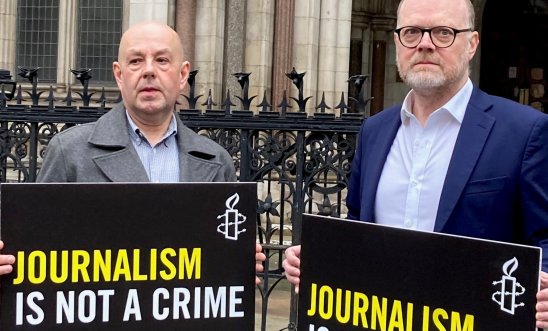
Press releases
'Landmark case for press freedom' - Northern Ireland and Met police broke law spying on journalists

Investigatory Powers Tribunal finds police broke law and breached human rights of Northern Ireland journalists Barry McCaffrey and Trevor Birney
‘Accountability must follow culpability and we now need cast-iron safeguards to prevent the PSNI from further abuse of covert surveillance powers. There can be no recurrence of the unlawful
practices which have seen the police treat press freedom with utter contempt’ - Patrick Corrigan
Responding to a judgment from the Investigatory Powers Tribunal (IPT) which today ruled that the police acted unlawfully and breached the human rights of Northern Ireland journalists Trevor Birney and Barry McCaffrey, Amnesty declared it a ‘landmark case for press freedom’.
The Investigatory Powers Tribunal, which is the only British court with statutory powers to investigate secret police surveillance, ruled that the Police Service of Northern Ireland (PSNI) and the Metropolitan Police Service unlawfully spied on the journalists in a bid to uncover their sources.
At the conclusion of a five-year investigation, the Tribunal found that the PSNI had repeatedly acted unlawfully, in breach of the European Convention of Human Rights and the Human Rights Act 1998.The unlawful behaviour reached all the way to the top of the PSNI with then Chief Constable Sir George Hamilton being found by the Tribunal to have acted unlawfully by failing to “consider whether there was an overriding public interest justifying an interference with the integrity of a journalistic source”, when he authorised a spying operation against an official at the Office of the Police Ombudsman of Northern Ireland.
The judgment describes his decision to authorise the directed surveillance operation as “unlawful at common law” and that it violated the European Convention on Human Rights (ECHR) and the Human Rights Act 1998.
The IPT has now quashed the authorisation by the Chief Constable and ordered the PSNI to pay damages to the journalists for unlawful intrusion - the first time that the Tribunal has made such an order. This unprecedented move strengthens the legal rights of all journalists.
The evidence disclosed to the Tribunal has exposed wider PSNI practices of accessing journalists’ telephone communications data, including the targeting of journalists at the BBC.
Patrick Corrigan, Amnesty International’s Northern Ireland Director said:
“This is a landmark case for press freedom.
“The right of journalists to protect their sources is a cornerstone of a free society, and the PSNI saw fit to ride roughshod over every human rights safeguard designed to protect that right.
“The revelation via the Tribunal that the PSNI spied on staff from the Office of the Police Ombudsman – the statutory body which investigates police wrongdoing – should worry everyone who cares about policing and police oversight in Northern Ireland.
“The truth has had to be dragged kicking and screaming into the light, and today’s judgment is testament to the tenacity and determination shown by Trevor Birney and Barry McCaffrey.
“Accountability must follow culpability and we now need cast-iron safeguards to prevent the PSNI from further abuse of covert surveillance powers against journalists and others in Northern Ireland. There can be no recurrence of the unlawful practices which have seen the police treat press freedom with utter contempt.
“While the police saw fit to arrest journalists exposing police collusion in protecting the paramilitary killers of six men in the village of Loughinisland in June 1994, twenty years on they have still arrested no-one for those murders. Our thoughts are with the bereaved families on this day.”
Full disclosure now needed
The Investigatory Powers Tribunal (IPT) was examining a complaint by two Northern Ireland journalists who asked it to find out whether police used intrusive surveillance powers against them.
The journalists, Trevor Birney and Barry McCaffrey, were arrested in 2018 in connection to their work investigating the 1994 Loughinisland massacre.
The pair filed a complaint with the IPT after a court in Belfast ruled the 2018 search warrants and arrests were unlawful. Last year, it emerged that the tribunal had discovered the PSNI had previously accessed Mr McCaffrey’s phone while he was investigating potential corruption in the force. Further disclosures by the police to the Tribunal have revealed further incidents of police surveillance.
The tribunal also revealed how the Metropolitan Police, acting on behalf of the PSNI, had unlawfully obtained telephone data belonging to Barry McCaffrey and the then BBC journalist Vincent Kearney in 2012. This illegally obtained data was subsequently and unlawfully shared with the PSNI and Durham Constabulary when Trevor Birney and Barry McCaffrey were arrested.
Further disclosures at the tribunal revealed that the Metropolitan Police, again acting on behalf of the PSNI, obtained more than 4,000 text messages and phone communications belonging to Trevor Birney, Barry McCaffrey and more than a dozen journalists working for BBC Northern Ireland’s investigative TV programme Spotlight.
Amnesty is calling for full disclosure by the PSNI of all instances of its abuse of surveillance powers against journalists and others. We await the outcome of the McCullough Review to provide further answers, but a public inquiry may now prove necessary to ensure full transparency and restore public confidence.
Amnesty is also repeating its call on the PSNI to publish the report of its review of the disastrous Operation Yurta, which led to an unlawful search warrant and the arrest of journalists Barry McCaffrey and Trevor Birney, and for which no-one within the PSNI has been held to account. The PSNI has to date refused to publish the full review, which was conducted by a senior barrister in 2022, and found major failures by police.